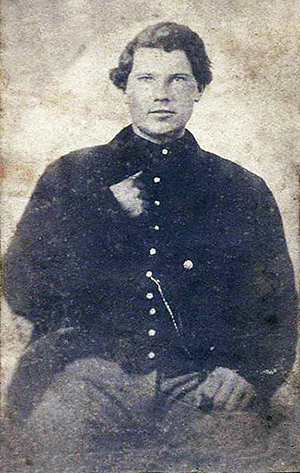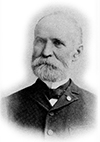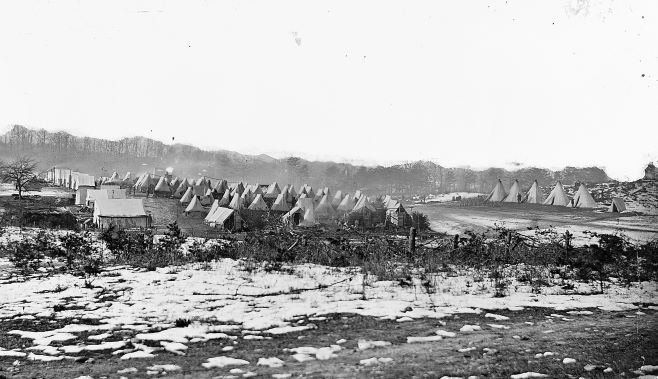For Freedom and HumanityThe Civil War Memorandum of Owen Thomas Wright, 14th Indiana Volunteers
1861: War BeginsTell Owen's story through Civil War history Understand the Civil War through Owen's story
The recently discovered Journals of Owen Thomas Wright, 14th Indiana Volunteers, provide a fresh perspective on the Civil War through the pen of a young soldier who experienced almost the entire war. You can read the complete summary of Owen's story here:
While I build Owen's site, you are welcome to browse and comment. I especially appreciate your insights that will help me tell Owen's story through the context of history, as I hope that we can gain a better understanding of history through Owen's story.
You can comment directly under each available article or directly send me a message through the contact form:
1861: The War Begins
- Details
- © 2020 by Brent A. Duncan, PhD
Owen Thomas Wright answers Abraham Lincoln's first call for troops and joins the 14th Indiana Volunteers to "fight for the most sacred rights of freedom and humanity." Owen experiences his first battle at Rich Mountain.
Related:
- 01 I volunteered
- A nation is torn apart
- Captain E.H.C. Cavins, 14th Indiana, Company D
- The rebels were fleeing: Battle of Rich Mountain
June 5, 1861
On the 5th of June in the little town of Scotland Greene Co., Indiana: I volunteered in defense of the most sacred rights of freedom and humanity. Yes! I volunteered to fight and if necessary to die for that flag that flitted through the smoke of battle in Bunker Hill, New Orleans, Buena Vista, and Fort Sumter.
[See A nation is torn apart]
June 6, 1861
I left my Parents, Brothers and Sisters, and "Sweet-Hearts" for Bloomfield and from there to the seat of war. Never shall I forget the last lingering look that I cast towards seven others that had volunteered with me, put up for the night. The friends of the Union gave us a hearty reception. I return my sincere and heartfelt thanks for the kindness bestowed upon me by Mr. Cavins likewise Mizo Cavins.
June 7, 1861

We started for Terre-Haute where Capt. Cavins' Company embarked one week before. He did not have his company quite full and was recruiting up. We arrived within fifteen miles of the city that day and put up for the night. We came into camp the next day about noon.
[See Captain E.H.C. Cavins, 14th Indiana, Company D]
June 8, 1861
We were sworn in the same evening. Here we were drilled every day, Sunday excepted, eight hours per day.
June 30, 1861
The last of June we were removed to Indianapolis.
July 4, 1861
There was a great demonstration at the capital city and we were marched up to the arsenal and received our Muskets (sic).
July 5, 1861
We took our departure from Hoosierdom to the Old Dominion.
When we passed through Muncie Town we received the heartiest welcome that it has ever been my good fortune to obtain. When we came to that beautiful little town as soon as the cars stopped there came the tug of war for the cars were immediately filled with delicious cakes, pies and all sorts of sweat meats, smoking tobacco, etc., etc., etc.
Colonel Kimball thanked them for their kindness. Before night we passed into Ohio at Union City.
Midnight we passed through Columbus, the capital of Ohio. I was very sorry that I could not see it in daylight.
Next morning about sunup, we crossed the Licking River at Zanesville. Here is where the hilly country set in.
[See To the Old Dominion]

July 6, 1861
In the evening we crossed Ohio River at Bellair into the Old Dominion. At almost every house we passed in Virginia that evening we were cheered and I almost fancied myself back in Indiana. We passed several tunnels and several towns that night.
Bellair, Ohio. Owen crossed the Ohio River here on July 5, 1861 to enter Virginia, also known as the Old Dominion. Battles and Leaders).
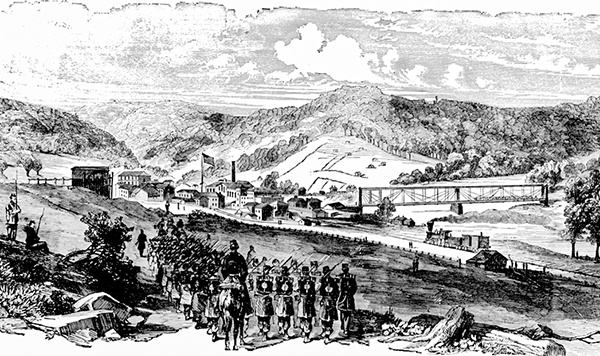
July 7, 1861
Early in the morning we found ourselves at Grafton. There were several secesh prisoners here. At 10 o'clock we came to Clarksburg. There were several other regiments here at this place. We started for the seat of war in Western Virginia. We traveled 7 miles at night and camped about 10 O'clock.
July 8, 1861
A little before daylight we took up a march and went 18 miles. The heat was very oppressive.
July 9, 1861
We arrived at Buchanan.

July 10, 1861
We took up our line of march and reached Middlefork Bridge and camped for the night.
The Sunday before there was a very severe skirmish took place here between 56 union men and about 300 rebels. There was one union man killed and several rebels. The rebels were routed.
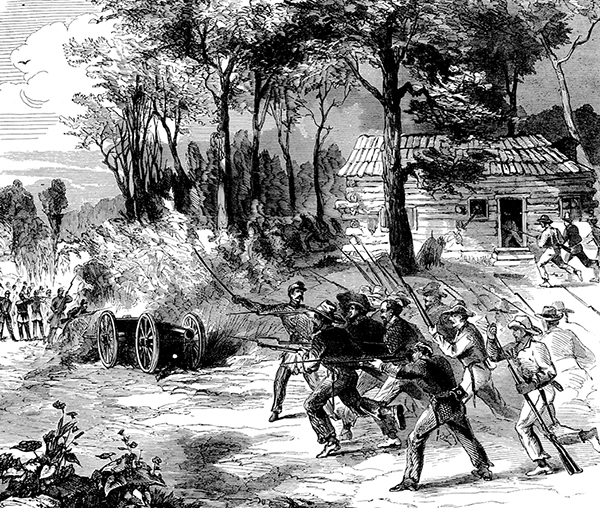
July 11, 1861
Battle of Rich Mountain
We came to Rich Mountain a little before that battle commenced. There was about 10,000 United States troops here. The rebels were stationed on a high hill three miles east and had batteries erected. Accounts of their strength are different. Some say 2500 and I expect it is true. They were posted on each side of the road in a very commanding position. There was three or four of our regiments commenced the attack.
Our 14th Regiment was drawn out in line of battle for four hours to be ready if they should need us on the hill. We could see the smoke and hear the report of arms. When the morning dawned the rebels were fleeing or had fled for they were many miles away.
We hastily took down our tents and started in pursuit. They left about fifty or sixty baggage wagons and 140 horses which we took of ours. About 200 were killed of the rebels and 20 or 30 of ours. We took several hundred prisoners.
[See The rebels were fleeing: Battle of Rich Mountain]
- Details
- © 2020 by Brent A. Duncan, PhD
By February the states of the Deep South had seceded from the Union and formed the Confederate States of America. Lincoln declared the secession void and unconstitutional. The day after his inauguration he sent troops to protect Federal property. On April 12, 1861, the Confederates responded by firing on Fort Sumter, a US fort in the mouth of the Charleston harbor off the coast of South Carolina, the hotbed of the rebellion. The Union troops surrendered the fort on April 13. The war had begun.
- Details
- © 2020 by Brent A. Duncan, PhD
Held in reserve at the Battle of Rich Mountain Owen and his companions got a taste of battle that made them "eager to test their punk.
- Details
- © 2020 by Brent A. Duncan, PhD
When the Civil War broke out, Elija H. Cavins recruited a company in Bloomfield, Indiana. As the most prominent citizen in town, Cavins became captain of what would become 14th Indiana, Co. D, Owen's company.
The son of Judge Samuel Cavins, Elijah (who went by his initials, E. H. C.) was a Green County attorney. Cavins and his wife had two children when he went to war.
Captain Cavins distinguished himself as a capable leader. By the end of the war, he earned the rank of major.
- Details
- © 2020 by Brent A. Duncan, PhD
The 14th Indiana is sent to the desolate summit of Cheat Mountain to guard the Staunton-Parkersburg Turnpike and prevent the Confederates from cutting the Baltimore and Ohio Railroad. They face hostile opposition from locals, get surrounded by Lee's troops in the Battle of Cheat Mountain, and survive to fight a skirmish at Greenbrier Bridge.
- Details
- © 2020 by Brent A. Duncan, PhD
As Owen passed from "Hoosierdom to the old dominion," he was about to join the fight to free the western part of Virginia from Confederate control. The populations of the eastern and western portions of the Old Dominion were as different as the geography that separated them.
- Details
- © 2020 by Brent A. Duncan, PhD
Owen gets his first paycheck, then celebrates his 20th birthday. The 14th Indiana Volunteers dig in for the winter. Owen gets pitchfork by a farmer while sleeping in the hay.
- Details
- © 2020 by Brent A. Duncan, PhD
Due to some missing pages, there is a gap in Owen's narration from November 8, 1861, to March 23, 1862. Nevertheless, Owen's exploits can be tracked through the writings of historians and the journals of his companions.
- Details
- © 2020 by Brent A. Duncan, PhD
While the Union soldiers slept on the summit of Cheat Mountain, Lee surrounded them with 5,500 Confederate troops, Union soldiers from communication and supply lines. At least 1,500 rebels, led by Colonel Albert Rust, Third Arkansas Infantry, were close enough to observe the sleeping Union camp. Observing the fort and the entrenchments of Fort Monroe, Colonel Rust’s Lieutenant-colonel declared: “it would be madness to make an attack.”

